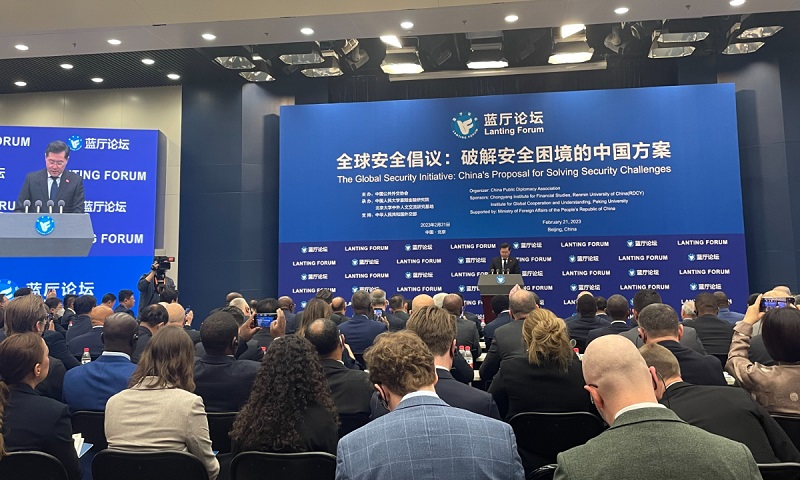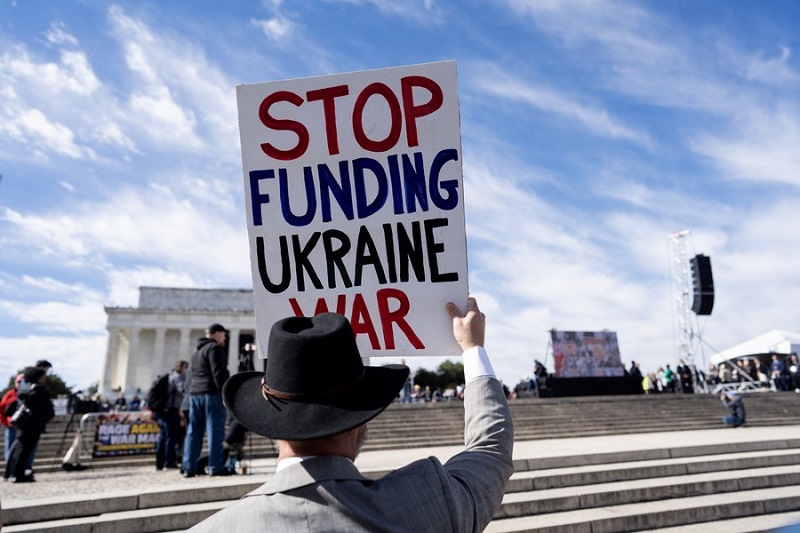As the ongoing Russia-Ukraine conflict entered its second year, China unveiled the Global Security Initiative (GSI) Concept Paper at the Lanting Forum in Beijing, advocating the principle of resolving disputes through dialogue and rejecting power politics.
The Russia-Ukraine conflict has caused a great loss of lives and property on both sides, disrupted the world economy and put rifts in international relations. Being a positive force for world peace, China said that it was “deeply concerned” about the current armed conflict which sees no end in the near future.
Regarding the importance of the GSI, Chinese Foreign Minister Qin Gang said that the GSI upholds the vision of common, comprehensive, cooperative and sustainable security, pursues the long-term objective of building a security community, and advocates a new path to security featuring dialogue over confrontation, partnership over alliance and win-win over zero-sum. The concept paper lays out core ideas and principles regarding international peace and security.
When the U.S.-led Western block had accused China of backing Russia for its special military operation in Ukraine, Qin Gang said his country will “join the international community to promote dialogue and consultation, address the concerns of all parties and seek common security.” He warned certain countries against blaming China and “fueling the fire” in the Ukraine conflict. In his veiled language directed at the U.S., saying, “We urge certain countries to stop touting ‘Ukraine today, Taiwan tomorrow’.”
Former UN Secretary-General Ban Ki-moon addressed the Lanting Forum via video messages. Hailing the release of the GSI paper, Ban Ki-moon said in his speech, GSI has remarkable points such as promoting the UN’s central role in security governance, promoting coordination and healthy interactions between big countries, creating conditions for peaceful solutions of hot issues through dialogue, addressing traditional and non-traditional security challenges, and strengthening the global security governance system and capacity.

The concept paper lays out 20 priorities of cooperation in response to the most significant and pressing international security concerns at present, which could be summarized as follows: upholding the UN’s central role in security governance, promoting coordination and sound interactions among major countries, facilitating political settlement of hotspot issues through dialogue, tackling traditional and non-traditional security challenges and strengthening the system and capacity for global security governance. The GSI is undoubtedly China’s broader effort to safeguard global peace and security which has been besieged by the U.S.-led Western block for their geopolitical interests.
Since its founding in 1949, the People’s Republic of China has been always a builder of world peace, a contributor to global development, a defender of the international order, as well as a mediator of hotspot issues and a provider of public good. China has never invaded other countries, never engaged in proxy wars, and never participated in any military bloc.
Genesis of the GSI traced back to President Xi Jinping’s keynote speech delivered at the opening ceremony of the Boao Forum for Asia Annual Conference 2022. The GSI gives clear answers to questions of present times such as what security concept the world needs and how countries can achieve common security. As another global public good after the Global Development Initiative (GDI) proposed by President Xi at the general debate of the 76th session of the United Nations General Assembly in September 2021, the GSI has contributed Chinese wisdom to eliminating peace deficit and offered Chinese solution to international security challenges. Fundamentally different from the outdated Cold War mentality and the Zero-sum game thinking, it provides a new course and new approach to addressing the root causes of international conflicts and solving security challenges facing humanity. The GSI is China’s gift to the violence-torn world, advocating that all countries should foster the new type of security that features dialogue, partnership and win-win cooperation instead of confrontation, alliance and zero-sum game.
It’s really gratifying to see that despite the hypocrisy and power politics regarding the foundation of the GSI by the West, particularly the U.S., it has garnered support from more than 80 countries and regional organizations. Without any hesitation it can be said with certainty that more and more countries and organizations will join in the effort to implement the initiative.

The global community saw how representatives of the U.S. and NATO states had turned the just-concluded 59th Munich Security Conference (MSC) into a “war-mongering conference” by promising increased destructive arms deliveries to Ukrainian President Zelensky. On February 20, U.S. President Biden paid an unannounced visit to the Ukrainian capital Kiev where he promised an announcement of more artillery, more ammunition, and more HIMARS for Ukraine worth $500 million. So far, the U.S. has provided about $50 billion in aid to Ukraine. In plain speak, the U.S. and NATO have been escalating the conflict by providing Ukraine with billions of dollars in lethal weapons since the start of the crisis.
While the Western world leaders are “finger-pointing” at China-Russia relations, Wang Yi, director of the Office of the Foreign Affairs Commission of the Communist Party of China (CPC) Central Committee, attended the MSC following a brief European tour and delivered a keynote speech, titled “Making the World a Safer Place” on February 18. In his address he opened up a new world of peace and prosperity by enhancing global cooperation. He further stated that there are “some forces” that do not want Russia-Ukraine peace talks to succeed.
During another meeting with Ukrainian Foreign Minister Dmytro Kuleba on the sidelines of the MSC on February 18, China’s senior diplomat reiterated that China has always been standing on the side of peace and dialogue, and insisted on promoting peace talks. China does not want to see the crisis being prolonged and escalated and is willing to work with the international community to prevent the situation from getting worse and strive to bring about peace. It is worth noting that China didn’t provide any military aid to Russia during the ongoing crisis despite “no limits partnership” between China and Russia. More importantly, the interaction between Wang and Kuleba strongly indicates China’s efforts to find a political solution to the Ukraine crisis. As such, the U.S. and other Western powers are in no position to lecture China on the Ukrainian conflict. They must keep in mind that China has no self-interest in the Ukraine issue.

Since the outbreak of the Ukraine-Russia conflict, China has been stressing the need to end the conflict through dialogue and negotiation. On the first anniversary of the Russia-Ukraine conflict on February 24, China as a permanent member of the UN Security Council released a 12-point position paper on the political settlement of the Ukraine crisis. “Relevant countries should stop abusing unilateral sanctions and ‘long-arm jurisdiction’ against other countries, so as to do their share in deescalating the Ukraine crisis and create conditions for developing countries to grow their economies and better the lives of their people,” the paper said. China maintains that the sovereignty of all countries must be respected, and the Cold War mentality abandoned.
It’s really a paradox that while the U.S. and its allies have stressed sovereignty and territorial integrity on the Ukraine issue, they have been blatantly interfering in other countries’ internal affairs and undermining their sovereignty and territorial integrity. On February 24, Stephane Dujarric, spokesman for UN Secretary-General Antonio Guterres, hailed China’s position paper on the Ukraine crisis as “an important contribution.” Dai Bing, charge d’affaires of China’s permanent mission to the UN, said, “Ukraine is not an arena for fights between major countries. No one should seek to benefit from the conflict at the cost of the Ukrainian people.” The bitter truth is that the U.S. is earning money from the crisis by making Ukraine a scapegoat.
The speeches of China’s top leaders and actions of the Chinese government have sent some important messages about China’s independent foreign policy of peace that China will “stay firm on the side of peace and dialogue, and play a constructive role in easing the situation.”
Over the years, China has been promoting a multipolar world with peaceful coexistence as a fundamental pillar among all countries equally. On October 16 last year, while delivering his keynote speech at the historic 20th CPC National Congress, President Xi presented a picture of a global China which has already acquired a global leadership to shape the international order. As Xi said, “China’s international influence, appeal, and power to shape have risen markedly.” It is hoped that being a defender of world peace and stability China should play the role of an intermediary between Ukraine and Russia to put an end to Europe’s worst conflict in decades. Let peace come down to the heart of the violence-torn world.
The article reflects the author’s opinions, and not necessarily the views of China Focus.